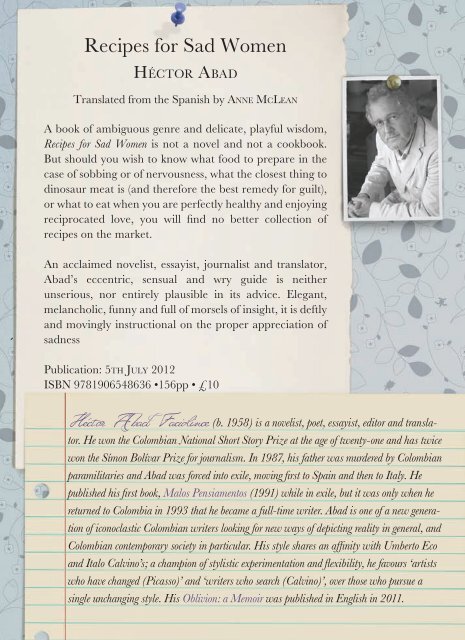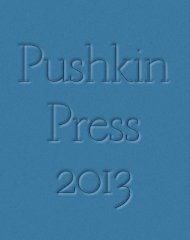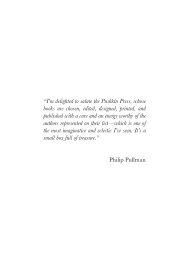Download Now - Pushkin Press
Download Now - Pushkin Press
Download Now - Pushkin Press
Create successful ePaper yourself
Turn your PDF publications into a flip-book with our unique Google optimized e-Paper software.
´<br />
Recipes for Sad Women<br />
héctor AbAd<br />
Translated from the Spanish by Anne mcLeAn<br />
A book of ambiguous genre and delicate, playful wisdom,<br />
Recipes for Sad Women is not a novel and not a cookbook.<br />
But should you wish to know what food to prepare in the<br />
case of sobbing or of nervousness, what the closest thing to<br />
dinosaur meat is (and therefore the best remedy for guilt),<br />
or what to eat when you are perfectly healthy and enjoying<br />
reciprocated love, you will find no better collection of<br />
recipes on the market.<br />
An acclaimed novelist, essayist, journalist and translator,<br />
Abad’s eccentric, sensual and wry guide is neither<br />
unserious, nor entirely plausible in its advice. Elegant,<br />
melancholic, funny and full of morsels of insight, it is deftly<br />
and movingly instructional on the proper appreciation of<br />
sadness<br />
Publication: 5th JuLy 2012<br />
ISBN 9781906548636 •156pp • £10<br />
Héctor Abad Faciolince (b. 1958) is a novelist, poet, essayist, editor and translator.<br />
He won the Colombian National Short Story Prize at the age of twenty-one and has twice<br />
won the Símon Bolívar Prize for journalism. In 1987, his father was murdered by Colombian<br />
paramilitaries and Abad was forced into exile, moving first to Spain and then to Italy. He<br />
published his first book, Malos Pensiamentos (1991) while in exile, but it was only when he<br />
returned to Colombia in 1993 that he became a full-time writer. Abad is one of a new generation<br />
of iconoclastic Colombian writers looking for new ways of depicting reality in general, and<br />
Colombian contemporary society in particular. His style shares an affinity with Umberto Eco<br />
and Italo Calvino’s; a champion of stylistic experimentation and flexibility, he favours ‘artists<br />
who have changed (Picasso)’ and ‘writers who search (Calvino)’, over those who pursue a<br />
single unchanging style. His Oblivion: a Memoir was published in English in 2011.




